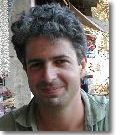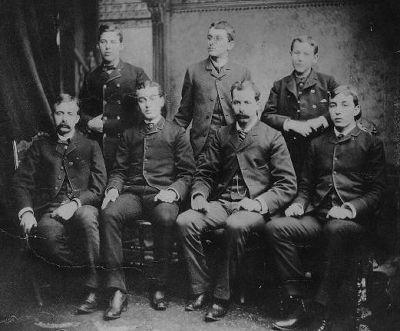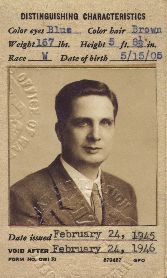|
|
iMahal Interview Series:
David Gimbel
July 22, 2001
|
Note: More than any iMahal interview to date, this discussion with David Gimbel brings to life the things that people can experience on their own path to success: cultural influence, early struggles, generous mentors, difficult obstacles, a thirst for learning, and above all, self discovery. We hope you find it as inspiring as we do.
|
 iMahal:
Thanks for agreeing to be interviewed. We are sure that our readers will find your path in life to be an interesting one. Your efforts to educate the world about archeology and history have been featured in various magazines and websites. Your career is actually just beginning, but already you are making a difference. To begin, we would like to talk about your upbringing. Our readers are very interested in the personal background of successful people. How would you describe your childhood years? Who were your heroes?
iMahal:
Thanks for agreeing to be interviewed. We are sure that our readers will find your path in life to be an interesting one. Your efforts to educate the world about archeology and history have been featured in various magazines and websites. Your career is actually just beginning, but already you are making a difference. To begin, we would like to talk about your upbringing. Our readers are very interested in the personal background of successful people. How would you describe your childhood years? Who were your heroes?
 Gimbel:
To talk about my upbringing, I need to set the family cultural context, because my upbringing was strongly influenced by my family background, which is very mixed. My father's great-great grandfather was a German Jew who came to the US from Bavaria in the mid-1830s. He emigrated partially as a reaction to the anti-semitism that was prevalent during the Metternich regime and partially to escape forced military service. As I understand it he arrived in the port of New Orleans, purchased a rifle and some other goods and set out to work as a trapper and fur trader along the Mississippi River. By the age of twenty five, he established a trading post in Vincennes, Indiana, which had the unusual policy of fixed prices and customer refunds. At the time, these policies were unheard of, particularly among minority groups such as Native Americans, who generally received less preferential economic treatment. Eventually his offspring expanded the business into a series of department stores, which no longer exist.
Gimbel:
To talk about my upbringing, I need to set the family cultural context, because my upbringing was strongly influenced by my family background, which is very mixed. My father's great-great grandfather was a German Jew who came to the US from Bavaria in the mid-1830s. He emigrated partially as a reaction to the anti-semitism that was prevalent during the Metternich regime and partially to escape forced military service. As I understand it he arrived in the port of New Orleans, purchased a rifle and some other goods and set out to work as a trapper and fur trader along the Mississippi River. By the age of twenty five, he established a trading post in Vincennes, Indiana, which had the unusual policy of fixed prices and customer refunds. At the time, these policies were unheard of, particularly among minority groups such as Native Americans, who generally received less preferential economic treatment. Eventually his offspring expanded the business into a series of department stores, which no longer exist.

|
|
Gimbel Brothers in 1890
|
My mother's family was part English and part Spanish. Some of them came to New England in the 17th century, so they must have had the similarly dubious distinction of leaving Europe for religious or political reasons.
In my childhood I was fortunate in many ways. I had a very supportive and close family, with strong family structure. I got a very good education. I had a grandfather in the US while growing up who was a caring mentor. We had a close relationship. I was also close to my great-grandmother. In our household, we had help who spoke Spanish. As a result, I learned Spanish before I actually learned English. This allowed me to relate to my Spanish linguistic identity.
I don't think I had any particular heroes. Perhaps I am different from other people in this respect. Though maybe I could say that a hero for me was my grandfather on my mother's side. He came to the US from Cuba at a very young age, and considered himself Spanish, Catalonian to be more precise. He was born in Cuba in 1905, seven years after Spain's defeat in the Spanish-American War and I think that that historical incident must have profoundly affected his sense of identity.
According to what he told me his family came to the New World because they were "segundos," the "second sons" of aristocratic families who would therefore receive no inheritance. Traditionally, segundos either entered the priesthood, or went of to make their fortune in the New World.

|
|
Grandfather's ID Card
|
My grandfather once told me that one of his ancestors had married the daughter of the "Cacique of Macaca" an indigenous Cuban chieftain and that the land for his family's sugar plantation was acquired by means of this marriage. Apparently, his family also built the first railway in Cuba, in order to carry sugar from their plantation, "Central Sofia," to Havana. I don't know much about his father (my great-grandfather) but my understanding is that he gave away all his inherited wealth to the Theosophical Society. My grandfather came to the United States as a young man and worked menial jobs during the day, while attending a "nighttime" high school in Brooklyn. I didn't even know such a thing existed until he told me about it! Like many other immigrants he later attended the City University of New York. Later, following the outbreak of the Spanish Civil War he ran an anti-fascist propaganda program in Washington, and during World War II he was stationed in Portugal and ran the Office of War Information for the Iberian Peninsula. My relation with him developed in me the feeling that the world is always in conflict.

All photographs copyright and courtesy of David Gimbel or Archaeos

|
 |

 iMahal:
Thanks for agreeing to be interviewed. We are sure that our readers will find your path in life to be an interesting one. Your efforts to educate the world about archeology and history have been featured in various magazines and websites. Your career is actually just beginning, but already you are making a difference. To begin, we would like to talk about your upbringing. Our readers are very interested in the personal background of successful people. How would you describe your childhood years? Who were your heroes?
iMahal:
Thanks for agreeing to be interviewed. We are sure that our readers will find your path in life to be an interesting one. Your efforts to educate the world about archeology and history have been featured in various magazines and websites. Your career is actually just beginning, but already you are making a difference. To begin, we would like to talk about your upbringing. Our readers are very interested in the personal background of successful people. How would you describe your childhood years? Who were your heroes?




